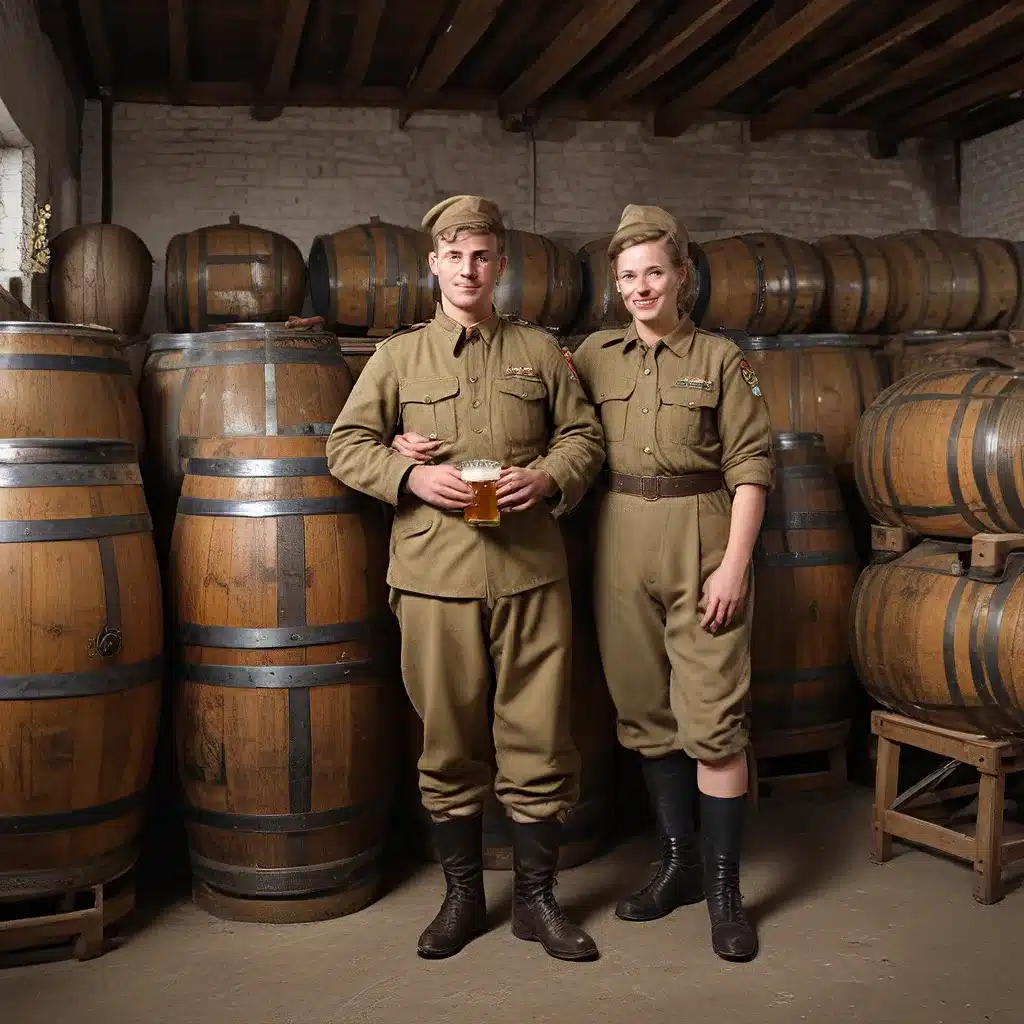
The Unbreakable Bond Between Beer and Battle
As I sit here, sipping on a frothy pint of ale, it’s hard to imagine that this humble beverage has played such a pivotal role in the history of warfare. But alas, the story of beer and battle is one filled with equal parts grit and gusto, a tale as old as time itself.
Let me take you on a journey, from the smoke-filled trenches of the Western Front to the cozy confines of the local taproom. Because when it comes to the surprising role of beer in wartime, the connection runs deeper than you might think.
Beer: The Soldier’s Solace
Picture this: a young soldier, huddled in the depths of a muddy trench, the thunderous roar of artillery echoing all around. Amidst the chaos and carnage, what might he reach for to steady his nerves and lift his spirits? Why, a refreshing pint of ale, of course!
During the First World War, the British government introduced a slew of wartime regulations that sought to curb the perceived threat of drunkenness on the home front. But even in the face of such restrictions, the thirst for beer remained unquenchable among the troops.
In fact, the Defence of the Realm Act (DORA) – a sweeping piece of legislation that gave the government unprecedented control over nearly every aspect of civilian life – could do little to dampen the soldiers’ desire for their favorite brew. Despite the government’s efforts to limit pub hours and reduce alcohol content, the troops continued to seek out their liquid courage, often risking punishment to do so.
The Trench Taproom
And where might these brave souls find their liquid respite? Why, in the most unlikely of places: the trench itself. That’s right, the very same muddy, shell-torn trenches that bore witness to untold horrors also became makeshift taprooms, where soldiers would gather to share a pint and momentarily escape the realities of war.
As one soldier described it, “The only way to get through this hell was to drink ourselves senseless.” And so they did, crafting primitive stills and fermenting whatever ingredients they could scrounge up to create a semblance of their beloved brews.
Imagine the scene: a group of weary soldiers, their faces etched with the strain of battle, gathered around a makeshift campfire, passing a tin cup filled with a dubious concoction they’d whipped up in the trenches. It was a moment of camaraderie, a chance to forget the horrors that surrounded them, if only for a fleeting moment.
The Brewers’ Battlefield
But the soldiers weren’t the only ones to feel the impact of war on their beloved beverage. The brewers themselves found their livelihoods and legacies tested by the trials of battle, their very existence hanging in the balance.
Take the story of the Rodenbach Brewery, for example. During the Second World War, this historic Belgian institution found itself in the crosshairs of the invading German army. But rather than succumb to the pillagers, the brewers of Rodenbach hatched a ingenious plan: they paid a ransom of 20,000 Belgian Francs to the Nazis, saving their precious foeders (those massive oak barrels that give Rodenbach its distinctive flavor) from certain destruction.
It was a bold move, one that would ensure the survival of this brewing legacy for generations to come. And in the aftermath of the war, these resilient brewers would go on to craft some of the most renowned and celebrated beers in the world, their stories forever intertwined with the trials and tribulations of wartime.
A Bittersweet Homecoming
But the impact of war on the beer industry didn’t end when the guns fell silent. As soldiers returned home from the front lines, they found their beloved watering holes had been transformed, their once-familiar haunts now subject to a slew of new regulations and restrictions.
The government’s wartime edicts had taken a toll, with pub hours slashed, alcohol content reduced, and the age-old tradition of “treating” (buying rounds for your mates) now a criminal offense. It was a bitter pill for the thirsty troops to swallow, a harsh reminder that the world they once knew had been forever changed by the ravages of war.
Yet, even in the face of such adversity, the resilience of the human spirit prevailed. Soldiers and civilians alike found ways to adapt, to carve out moments of joy and camaraderie amidst the gloom. And at the heart of it all, there was beer – the unbreakable bond between battle and beverage, a constant companion through the darkest of times.
The Enduring Legacy of Wartime Ales
And so, as I sit here, sipping on my pint, I can’t help but marvel at the rich and storied history that lies within this humble glass. For the story of beer and battle is not just a tale of wartime woes, but a testament to the human spirit, a reminder that even in the face of unimaginable hardship, we can find solace, solidarity, and a touch of levity in the most unexpected of places.
So, the next time you raise a glass at your local taproom, take a moment to reflect on the remarkable journey that brought that beer to your lips. Because in the end, the story of beer and battle is one that will continue to be poured, sipped, and savored for generations to come.

